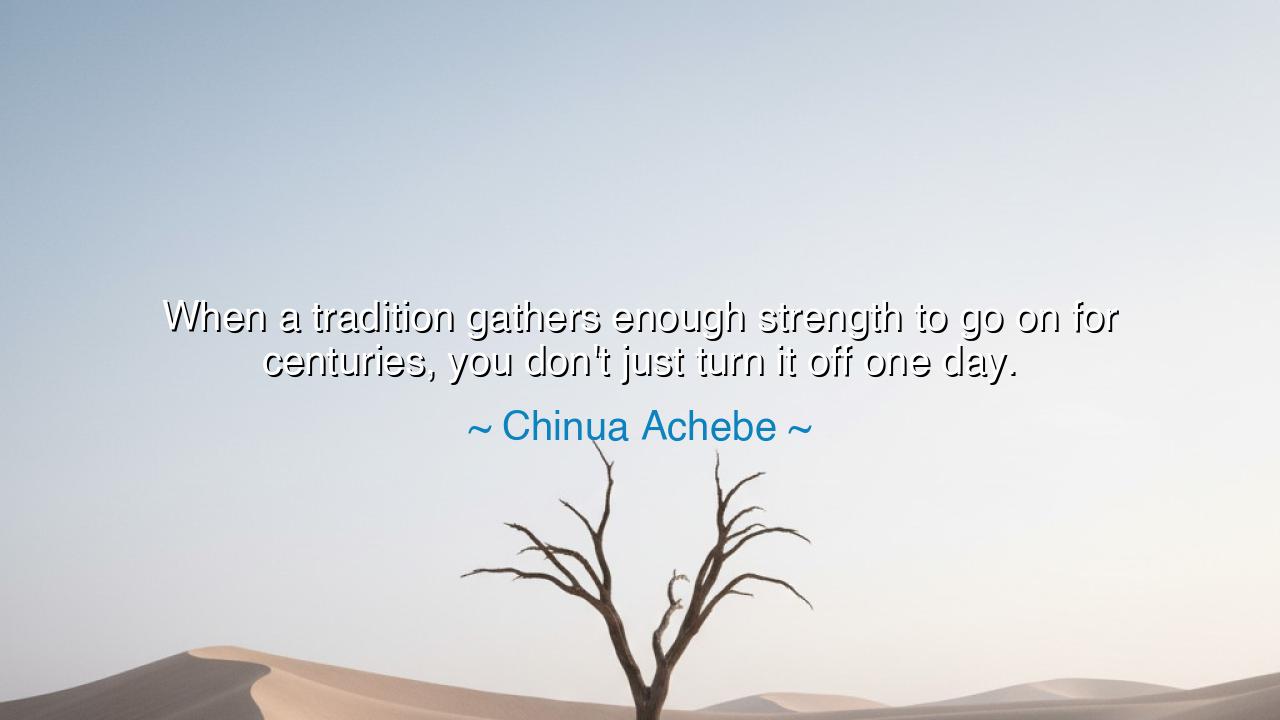
When a tradition gathers enough strength to go on for centuries
When a tradition gathers enough strength to go on for centuries, you don't just turn it off one day.






The words of Chinua Achebe — “When a tradition gathers enough strength to go on for centuries, you don’t just turn it off one day.” — speak as the voice of an elder who knows the weight of history. They remind us that the roots of a people run deep, and that what endures through time is not easily cast aside. For tradition is more than habit; it is memory woven into ritual, faith written into daily life, identity carved into the marrow of a community. To imagine it can be ended in a single breath is folly. Achebe, chronicler of Africa’s encounter with modernity and colonial disruption, saw clearly that traditions are living rivers, fed by countless springs of ancestry, flowing with unyielding persistence.
Tradition is not merely custom. It is the soul of a people made visible. When Achebe speaks of centuries, he invokes the image of time’s great weight, pressing down upon men and women, shaping them, molding their speech, their songs, their laws, their prayers. Such strength cannot be erased by decree or force; for even when beaten down, traditions whisper in secret, cling to memory, and rise again when the storm has passed. The wisdom of his words is that the enduring cannot be undone by impatience or arrogance.
History itself testifies. Consider the Jews in exile, scattered across lands far from their temple, stripped of their kingdom, pressed under foreign rulers. Many believed their identity would vanish into dust. And yet, through Sabbath, through scripture, through prayer, they carried their tradition across centuries. Empires rose and fell, but their customs endured. The Romans who destroyed Jerusalem are gone, but the Jewish people remain. Such is the power Achebe speaks of: a flame carried through the winds of history, unextinguished.
Achebe’s own land offers another mirror. In Nigeria, colonial rule sought to uproot local customs, to replace ancestral ways with foreign tongues and foreign gods. Many traditions were wounded, yet they did not perish. They adapted, transformed, and survived. The masquerades still dance, the proverbs still instruct, the elders still guide with the wisdom of the ancestors. This is the truth of tradition: it bends, it shifts, but it does not simply vanish at command.
And yet, Achebe’s words are not a defense of blind clinging to the past. He was no stranger to the dangers of tradition when it stifles or oppresses. Rather, he calls us to humility — to recognize that traditions, once strong enough to endure centuries, demand careful handling. They cannot be erased with scorn, nor should they be dismissed as relics. They must be understood, honored, and, when necessary, reformed with reverence. For to tear them down recklessly is to wound the very identity of a people.
The lesson is plain: in our lives, when we confront tradition, we must do so with wisdom. If we inherit customs that uplift, we must carry them proudly. If we inherit customs that burden, we must not seek to destroy them in one violent blow, but to transform them gently, lest we shatter the spirit of the community. Ask yourself: what traditions do I hold? Do they give life, or do they bind? Can I preserve their essence while reshaping their form for a new age?
Practical wisdom follows. Do not despise the old ways simply because they are old. Learn them. Question them. Carry forward what is noble — reverence, gratitude, remembrance, unity. And when the time comes to change, do so with care, as one prunes a living tree — cutting not to kill, but to help it grow stronger. For the tree of tradition, once rooted for centuries, cannot be felled in a day without leaving behind a desolate field.
Thus Achebe’s words endure as a lantern of guidance: tradition is strength, tradition is memory, tradition is identity. To honor it is to honor those who came before, and to shape it wisely is to prepare the path for those yet to come. Do not try to silence the river of centuries in a moment; instead, learn how to let it flow, and, if needed, guide its waters toward new life. For that is the work of the wise.






AAdministratorAdministrator
Welcome, honored guests. Please leave a comment, we will respond soon